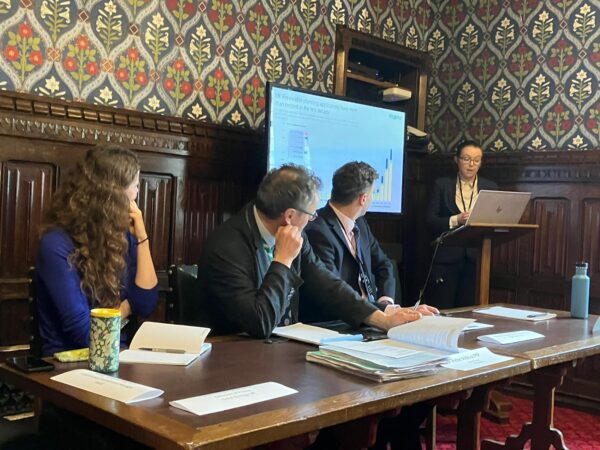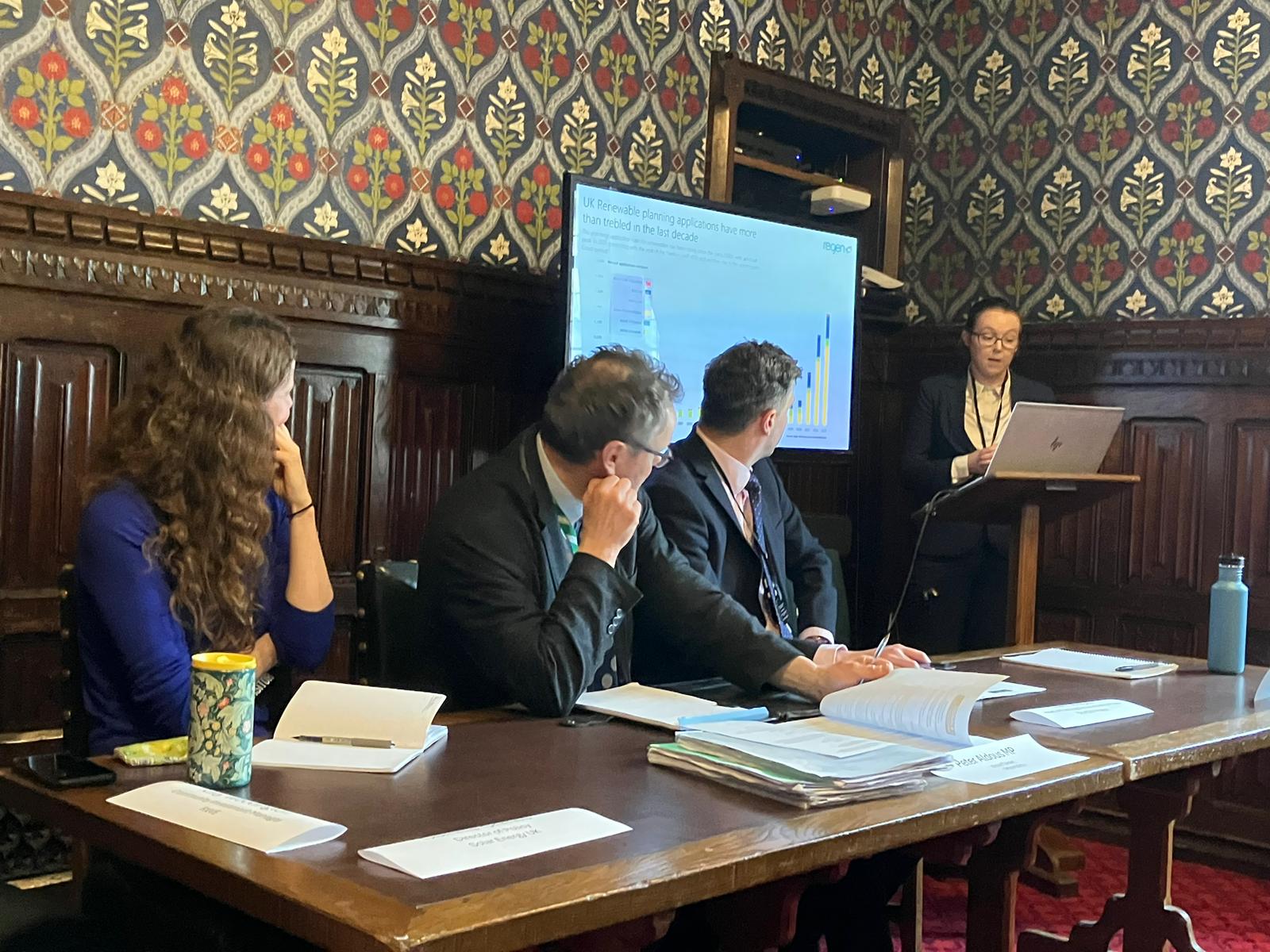In her return to Parliament, Rebecca Windemer made it extremely clear that urgent reform in planning policy is needed if the UK is to reach net zero.

This week, I returned to parliament to speak with the Parliamentary Renewable and Sustainable Energy Group (PRASEG). I delivered the context setting presentation at the group’s event on planning regimes, public engagement and community benefits for onshore renewables, and participated in two panel discussions about the planning system, and community benefits and engagement. For me, the key messages were that there is:
- A strong appetite for planning reform
- An urgent need to reform onshore wind policy in England
- A recognition of the importance of high-quality engagement
- Clear value in tailored forms of community benefits
- A need for stronger support for community energy
The event was chaired by Peter Aldous MP who facilitated a lively discussion with the audience of industry representatives and parliamentarians. I’d like to thank PRASEG for the invitation and for the interesting discussions on the day, the detail of which is outlined below.
A strong appetite for planning reform
There was a clear appetite and recognition that the planning system needs to be improved if we are to meet our renewable energy targets. The panel discussions on planning and communities overlapped which reflects the importance of communities being fully involved in the planning process.
Grant Douglas from Scottish Power and Gemma Grimes from Solar Energy UK joined the first panel discussion. We covered the need for policy improvements for onshore renewables at the national and local authority levels as well as the urgent need for a better resourced planning system.
An interesting question was raised about where to start with planning reform; local or national level? There was agreement amongst the panel that to change local level policies we need change and certainty at the national level. In particular, there is a need for the National Planning Policy Framework (NPPF) in England to give greater weight to renewables and net zero. Also, there is an opportunity for the devolved nations to learn from each other, for example, Scotland’s National Planning Framework 4 sets out far greater priority for renewables compared to the NPPF.
The urgent need to reform onshore wind policy in England
Unsurprisingly, we discussed the planning process for onshore wind in England and how the policy should be changed. I argued that the NPPF footnote on onshore wind needs to be removed so that onshore wind is treated in the same way as other forms of renewable infrastructure. I also noted that the planning system already provides the opportunity for community views to be collected and considered in decision making through consultations and the submission of formal responses to planning applications.
A recognition of the importance of high-quality engagement
For the second panel discussion, the spotlight shifted to focus on public engagement and community benefits. For this panel Gemma and I were joined by Callum Whiteford from RES and Katy Woodington from RWE.
In my opening remarks I focused on the importance of undertaking public engagement as early as possible so communities are properly involved in the design and development of a project, as well as the need to actively involve the harder to reach members of a community. I also discussed the importance of ongoing community engagement over the operational life of a project.
The panel discussed various approaches to community engagement including how to encourage involvement from people that may be ‘on the fence’ about a project and the value of keeping planning discussions and community benefit conversations separate. There was also an interesting discussion on the potential for digital tools to add value to the planning and community benefits process through making it easier for people to participate.
I also raised the importance of public awareness and education. I suggested that as well as engagement on specific projects, communities need to understand that a huge scale of renewable energy development is needed across the UK, the associated infrastructure required to meet our renewable energy targets, and why infrastructure development is location-specific.
The need for tailored forms of community benefits
I found it positive that industry colleagues recognised the need for benefits packages to be tailored to the needs of the communities involved in, or close to, energy projects. The panel discussed the importance of sharing best practice including the forthcoming community benefits register for onshore wind. I also raised the need for greater support for communities to help them get most value from community benefits.
At Regen we have been calling for communities to have the option of shared ownership, so I was pleased to hear an example from RES of how offering shared ownership led to greater community support for an onshore wind project.
The need to support the community energy sector
I was pleased that the chair raised a question on role of community energy in our future energy system. I was keen to highlight the high levels of ambition from community energy groups and the vital importance of community energy. I raised the need for both greater policy support as well as a permanent community energy fund and the need for the promised government consultation on community energy.
Overall, it was a useful discussion and I am keen to help progress the suggestions that were discussed.

At Regen we are continuing to develop our work on planning and community engagement If you are a Regen member and would like to help shape our work on planning then please sign up for our first planning working group meeting on 23rd May.
